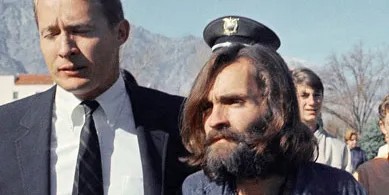Charles Manson (1934-2017) stands as one of America’s most notorious criminal figures, whose actions and influence led to a series of brutal murders that shocked the nation in 1969. Born to a teenage mother in Cincinnati, Ohio, Manson’s early life was marked by instability, neglect, and a pattern of criminal behavior that began in his youth.
From his earliest years, Manson spent much of his life in and out of correctional facilities. His criminal record began at age 13, with charges ranging from robbery to car theft. These formative years in institutions would later influence his manipulative abilities and understanding of human psychology, which he would exploit to devastating effect.
In the 1960s, Manson emerged into a California transformed by the counterculture movement. After his release from prison in 1967, he began attracting a group of followers, mostly young women, who became known as the “Manson Family.” Establishing himself as a self-proclaimed guru, he manipulated his followers through a combination of drug use, sexual exploitation, and apocalyptic prophecies.
Manson’s philosophy was a twisted amalgamation of Beatles lyrics, biblical prophecies, and racial theories. He particularly fixated on the Beatles’ White Album, interpreting it as a prophecy of an approaching race war he called “Helter Skelter.” This paranoid vision would ultimately drive his followers to commit murder.
The culmination of Manson’s influence came in August 1969, when members of his cult carried out a series of murders under his direction. The most infamous was the killing of actress Sharon Tate, who was eight months pregnant, along with four others at her home. The following night, supermarket executive Leno LaBianca and his wife Rosemary were also murdered.
Though Manson didn’t personally commit these murders, he was convicted of first-degree murder and conspiracy to commit murder in 1971. His charismatic presence during the trial, along with the devoted followers who camped outside the courthouse, captured national attention and cemented his place in American criminal history.
Manson spent the remainder of his life in prison, where he continued to attract media attention and fascinate the public through interviews and writings. He died in 2017 at the age of 83, having never shown remorse for his crimes. His case remains a chilling study of cult psychology, manipulative leadership, and the dark potential of charismatic influence.
The Manson case fundamentally changed American culture, marking the symbolic end of the 1960s counterculture movement and instilling a new sense of vulnerability in society. It continues to serve as a cautionary tale about the power of manipulation and the dangerous appeal of charismatic extremism.



Recent Comments